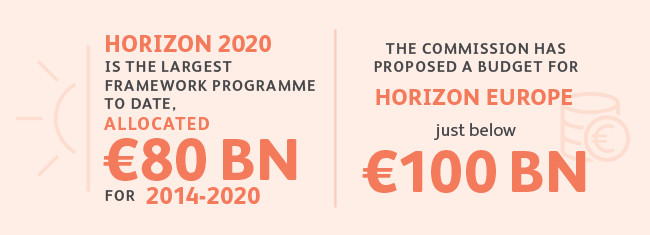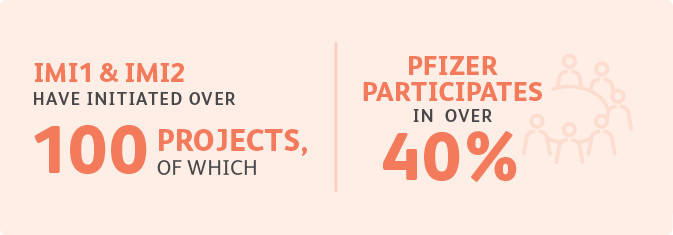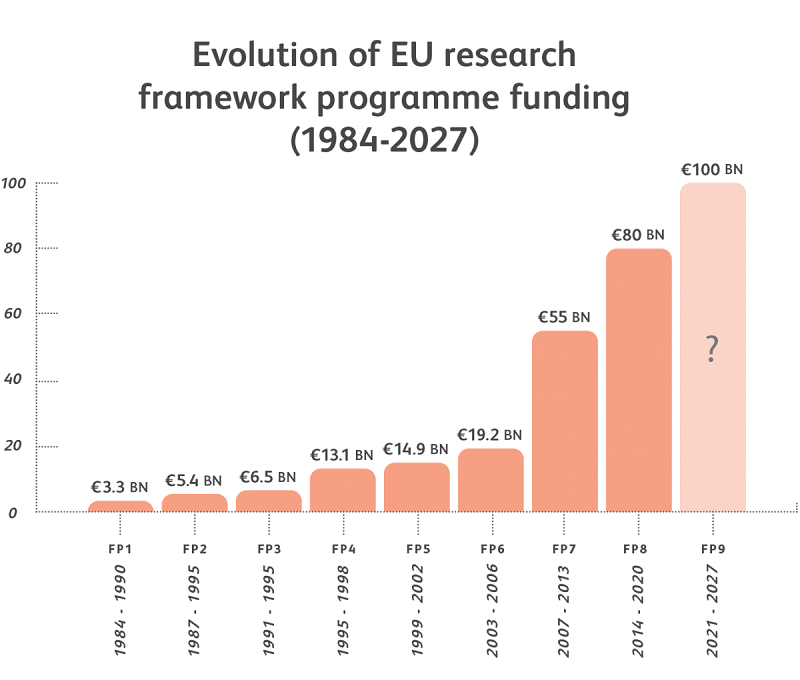EU research and innovation policy
The EU aims to be a leader in research in innovation (R&I). To this end, R&I should play a crucial role in Europe’s next long term strategy. In particular, the EU has the opportunity to agree an ambitious “Horizon Europe” programme, including a valuable public-private partnership for health research.
Horizon Europe
The Commission’s current research funding framework programme, Horizon 2020, will be replaced by Horizon Europe as part of the transition to the EU’s next multi-annual financial framework (MFF), for 2021-2027.

Although significant, EU Framework Programmes make up a small proportion of total public R&I funding in Europe1. Nonetheless, the EU can play an important role in coordinating research in Europe, and avoiding duplication.
Horizon Europe also introduces research ‘missions’, which can work towards a specific goal and engage with citizens’ aspirations.
‘Radical collaboration’: the EU’s public-private health research partnership
EU framework programmes include a number of research partnerships, intended to foster collaboration between diverse and complementary partners. An example is the “Innovative Medicines Initiative” (IMI), the world’s biggest public-private partnership in health research.2
IMI was first set up in 2008, and is made up of project consortia including academics and SMEs, funded by the Commission, and pharmaceutical companies, which contribute their own resources to the project (they do not receive Commission funding).
IMI2, running under Horizon 2020, has a total budget of over EUR3bn, of which EUR1.5bn is contributed in-kind (i.e. staff time) by pharmaceutical companies (brought together by the trade association EFPIA). Outgoing Research Commissioner Carlos Moedas has praised IMI2 as a model of ‘radical collaboration’.3

The next health research public-private partnership
To build on the success of IMI, the Commission has proposed a health research partnership for Horizon Europe that includes further health sectors, such as medical devices and imaging.
The value of IMI projects comes from the direct collaboration between academic, SME and larger company researchers. This is driven by in-kind contributions from large companies. Making future project participation dependent on additional cash contributions from large companies would kill the collaborative nature of these partnerships and severely limit engagement.
Projects benefit from engaging with the best industrial researchers regardless of where they are located. Companies don’t duplicate research capabilities: the right person must be able to contribute, wherever they are based. If they are outside the EU, the EU benefits from their engagement as academic and SME partners gain from world-class knowledge. This is a powerful in-flow of benefit to the EU and no cash from the EU is used to fund those efforts.
To secure dissemination of results and Europe’s competitiveness, access to publications and research data should be “as open as possible, as closed as necessary”.
A holistic policy approach
It is not just the EU’s funding programmes that will have an impact on innovation, but the broad array of policy choices. For example, national implementation of the General Data Protection Regulation (GDPR) needs to be optimised to enable legitimate health research.
The EU is less attractive than the US as an environment for private investment in R&I, which should be a priority in developing a Capital Markets Union. Policymakers in all areas need to reflect on how their decisions affect R&I in Europe.
Key Policy Points
During the 2019-2024 legislature, we call on the EU and its Member States to:
- Reflect on how to support the R&I needed to tackle Europe’s diverse societal challenges, including in the EU’s next long term strategy;
- Adopt an MFF and Horizon Europe budget which reflects Europe’s ambition for innovation in health;
- Commence a health research public-private partnership immediately in 2021, without a delay in funding opportunities;
- Recognise the importance of in-kind contributions to partnerships, and avoid mandatory cash contributions for large companies;
- Allow in-kind contributions to partnerships regardless of geography.

References
1 Eurostat cites public R&D on health in the EU28 as c.EUR9bn per year. The Commission’s proposal for Horizon Europe allocates c.€1bn per year to the ‘health’ cluster.
2 More information can be found on IMI’s website.
3 Commissioner Moedas made this statement during an event in Brussels, Belgium, on 27 June 2018 to mark the 10th anniversary of IMI.